This section is for paid subscribers only. Our subscription is only $3700/- for one full year.
You get unlimited access to all paid section and features on the website with this subscription.
Subscribe to read full article
This section is for paid subscribers only. Our subscription is only $37/- for one full year.
You get unlimited access to all paid section and features on the website with this subscription.
Not ready for a full subscription?
You can access this article for $2, and have it saved to your account for one year.
- Release Date1939
- GenreSocial
- FormatB-W
- LanguageHindi
- Run Time139 min
- Length3818.53 metres
- Censor RatingU
- Censor Certificate NumberU-42832-MUM, U-81074-MUM
- Certificate Date28/04/1976
- Shooting LocationThe Bombay Talkies Studio, Malad
Love is life's greatest pleasure, it's most beautiful necessity.
Youth knows but half the world and thinks it knows all, till Love opens the gates of the other half which, in truth, is a new world.
Radha was young and handsome and simple and full of joy. She never felt she lacked anything. To see her sing her way to the water ghat, pitcher in hand, was a daily event that folk along the path looked up to, with pleasurable anticipation.
It was a sight that inspired even Banwari, the Zaminder's right-hand man for all left-handed enterprises. Banwari made overtures to Radha, only to be repulsed. Down the last step of the gate, he saw her filling her pitcher. He stepped on to catch her alone, only to be welcomed by a goodly pebble that came tearing the air and tore the skin on his forehead.
With Banwari's retreat, Radha was just feeling relieved, when she espied a head rising above the ghat's crest. Swiftly was a second pebble despatched, and it brought forth an expletive in a voice that was not Banwari's.
Down the steps came a handsome youth, pressing his forehead. Radha made amends to the stranger by bandaging his wound.
It was not only his forehead Radha pierced; she had pierced his heart with delicious shaft.
Contrition over her mistake was not the only feeling in Radha's mind; her interest extended beyond the wound, to the youth himself.
Radha was the adopted daughter of Madhavdas Babajee, head of the local Vaishnav Math two hundred years old.
The young man introduced himself as Kamal, only son of the Zamindar Jainarayan; he had returned home on completion of his education; and he was a poet, as he demonstrated on the spot. "Radha, Radha", he sang, "My life is entangled..."
The wound on Kamal's forehead quickly healed; but the pleasurable pain in his heart demanded the healing hand of Radha. His father tried to introduce him to the estate to which he was heir. But estates did not interest Kamal. He had come into a greater estate.
And Radha continued her daily to the ghat, but not merely to fill the pitcher. She filled her heart with Kamal's company.
Love, like a cough, cannot be hidden. Two persons sensed the Radha-Kamal feeling. One was Rama, friend of Radha and wife of the Zamindar's estate manager Ramesh. She warned Radha of the disparity in social status which made the Radha-Kamal dream impossible to realise. But love has its own code of belief.
The other person to make the discovery was Banwari. Promptly, he poured poison into the Zamindar's ears. Incredulous, the father sought proof, and saw the son placing a gold "kangan" on Radha's hand.
Rapid results followed this sharp shock to the Zamindar's prestige. Old Madhavdas received an ultimatum to marry away young Radha. Kamal was ordered away to the city, on the transparent pretext that a Zamindar-to-be must study law.
With the sacrificial instinct of true love, Radha surrendered to Kamal the "kangans" that were the pledge of his sincerity. With the undaunted loyalty of true love, Kamal made her keep the Kangans and to promise to wait for him.
Love throws the bridge of faith across present calamity to future joy.
Radha kept the Kangans, with the single stipulation that should anything make them lose their significance, she would surrender them to Kamal again and, simultaneously, surrender her unwanted life to her Maker.
Kamal reached the city with his mind made up. Independence of the purse would bring him freedom a novel that proved a best-seller but not a good enough seller to induce the wily publisher to part with any substantial sum to the author. But it brought him a stage enthusiast. And, as the young lover planned the Radha-Kamal castle of his dreams, fate was laughing on the sly.
Zamindar Jainarayan was too used to authority to realise that indiscreet use would endanger it. So he planned his son's wedding with another Zamindar's daughter, and sent a summons to the son in the city.
Kamal's prompt and firm refusal created a blaze whose blind rush destroyed the Vaishnav Ashram of Madhavas Babajee. Banwari, the instrument of his master's wrath, chose his own wage for the deed of destruction. The wage was Radha, whom he took to a lonely house overlooking the swift current of a river. Between the hateful Banwari and the merciful stream, Radha made her choice and threw herself into the current.
No man who loves, is quite depraved; and Zamindar Jainarayan loved his son. When the rush of wrath subsided; he viewed the results with real repentance and felt hopeless and helpless.
But the surprising news of Radha's survival awakened him to action. Right actions in future are the best apologies for past wrongs. So he started in search of Radha who, he understood, was going to the city in search of Kamal.
Here, fate again took a hand at her own tantalising game.
Jainarayan and Radha, travelling in two compartments of the same train, were not aware of each other's presence. Each pursued a forlorn search in the city where Kamal, learning that Radha was dead, was trying to vent his sorrow in a stage representation of his own life's supposed tragedy.
Then real tragedy almost overtook him. Radha, happening to reach his residence, thought he was making love to another girl, when in reality he was only going over some stage dialogue. Radha looked at the gold kangans on her hands. They had now lost their significance. She promptly surrendered them at Kamal's doorstep, and proceeded to surrender her life. Man's love is part of man's life; it is a woman's whole existence.
In the cause of Love, Fate gives at least as much chance to Youth as, in the cause of Justice, it gives to Right. And, in this case, you will thrill to youth's spectacular triumph in love, with age rendering the blessings of ripe affection.
[From the official press booklet]
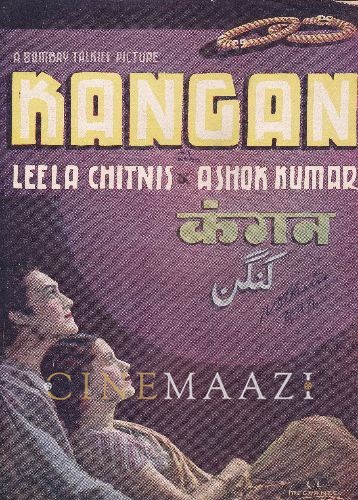
Cast
Crew
-
BannerBombay Talkies, Bombay
-
Director
-
Producer
-
Music Director
-
Lyricist
-
Story Writer
-
Screenplay
-
Dialogues
-
Cinematography
-
Editing
-
Costumes
-
Make-up
-
Laboratory/ Processed atThe Bombay Talkies Studios







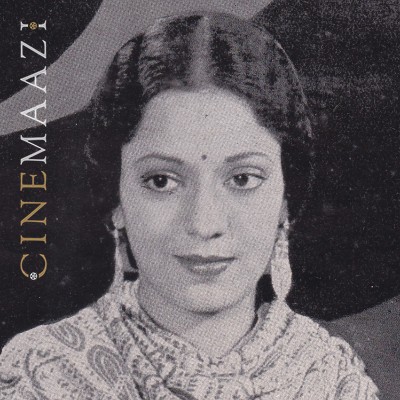

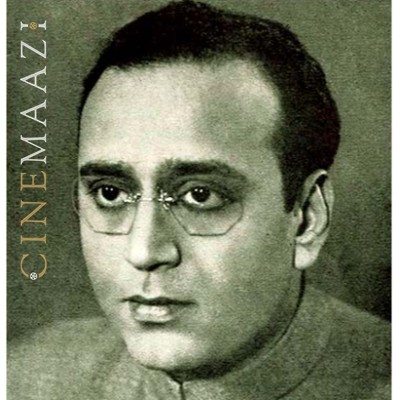
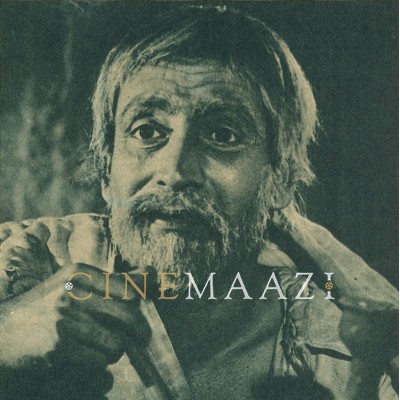
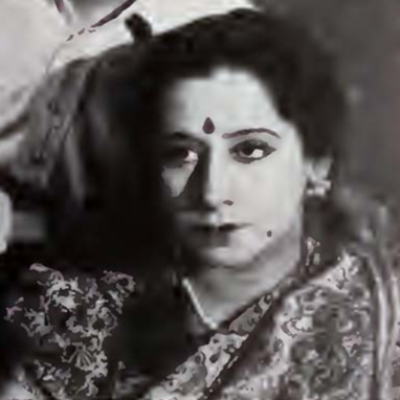
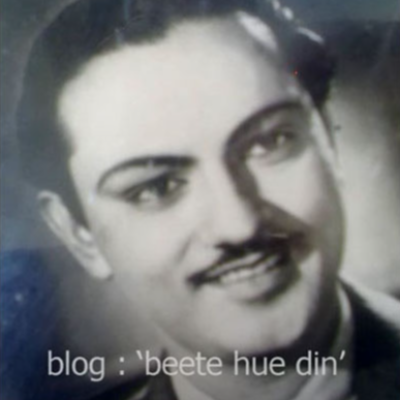

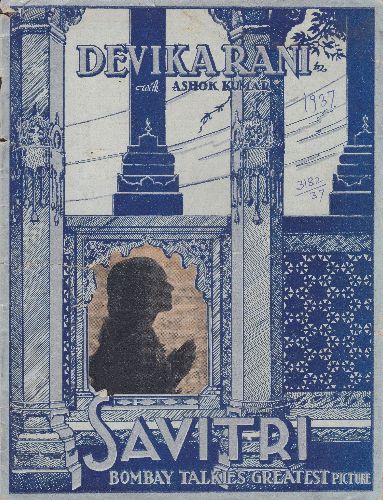

.jpg)



